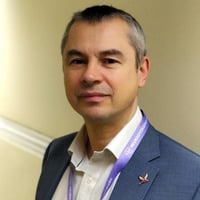How data is transforming government productivity
How can public sector organisations make the leap from evidence-based decision-making to using enhanced data capabilities that deliver a step change in public sector productivity?
The Government Data Show brought together a panel of UK public sector digital leaders to explore how innovative, forward-looking organisations are exploiting their datasets to drive not just productivity but, crucially, better outcomes for end users and citizens. The discussion session - Data-Driven Government Productivity, supported by Hitachi Solutions, revealed a picture of both the value and perception of public sector data specialists being transformed in government.
Neil McIvor - Chief Data Officer & Chief Statistician, Department for Education
The main thing most Chief Data Officers are doing across industry is looking at how we can rationalise our data estate, making sure it's effective and efficient. 
The right accessibility to the right data, of the right quality, at the time of need. We've been doing technical work over the last 18 months to two years in the pandemic, looking at how we understand, on a day-by-day basis, what's happening in the education sector - how many kids are in school, how many teachers are off with Coronavirus.
The big difference is we're now not seen as the ‘tech people’ or the ‘data people’ - we are seen as the ‘solutions people’ who come in to solve something when you’ve got a problem. A really good example of that was when we started rolling out testing in schools over Christmas. We were asked to roll out a technical solution that moved very quickly from ‘build a thing for us’ to ‘we have the experts to understand the end-to-end process and how people will flow through it’ - almost like systems thinking, how people flow through from an individual point of view, not just the tech side of things.
Edward Pikett - Director Central Government, Technology and Transformation, Hitachi Solutions
Coming into Government departments, we see the same things - in particular, silos. I would say the challenges sit within a department, but the real problems sit in the grey areas between departments, for interoperability integration standards. If Government can use data as the hammer to crack that nut to sort out that grey area, or use data as an excuse to rethink that model of very fixed, thick black lines around departments, then everyone - citizens, businesses employees - their lives will improve, because it will enable collaboration, it will find efficiencies, and ultimately will drive and improve services for people.
A lot of people's eyes are being opened by the work being done by the kind of people on this panel at the moment, who are surfacing problems and solving problems daily, and really sharing how you can transform the way Government works. But it needs to have a whole-of-government approach and it needs to not think about things in that traditional way of Government departments - vertical lines, silo structures and a top-down approach. It needs to be flatter, it needs to be blurred lines in between those departments.
Jo Shannon - Director of Technology and Design, Ordnance Survey
Most people think of Ordnance Survey as being about paper maps, but that actually accounts for a very small part of our business.  What we're really about is the digital representation of Great Britain for use in government, business and citizen services.
What we're really about is the digital representation of Great Britain for use in government, business and citizen services.
I work with very talented technologists, data scientists and experts, and it's easy to get carried away by the latest technology, but actually a lot of our process and ethos are around what is the outcome we're trying to achieve? What difference are we trying to make? Let's make sure we truly understand that, from a customer perspective. If you start with the tech, and what the tech can do, you end up with a mismatch.
For our data scientists and engineers, it’s that purpose-driven work that really excites them just as much as the tech. We've been trying to really push and enable a lot more contact with the end user, the customer, or the end scenario. In that way, much more knowledge is gathered around the problem space and opportunity space by the deeper technical skillsets and people in the team, rather than historically, trying to keep a sort of separation between people that engaged with end users and people that do the techie stuff.
Richard Godfrey - Associate Partner, GovX Digital
We know it's quite difficult, when you're from a technical background, talking to the business users in a language that both parties understand.  IT for me is the part of the organisation that’s trying to make every other department better at what it does, which might be through software solutions, data insights, or various other work.
IT for me is the part of the organisation that’s trying to make every other department better at what it does, which might be through software solutions, data insights, or various other work.
The key takeaway for me is the pre-work that you need to do before you start working on anything and understanding exactly what the needs are, what you're trying to achieve, and then finding the right amount of data to achieve that so it doesn't need masses of datasets. Sometimes two or three datasets are all you need, or sometimes it's just finding out via trial and error, seeing what gives you the information, and going forward from there.
The conference runs 14-23 September 2021 - register for free today to watch live or catch up On Demand:





.png?width=600&name=GovX%20Show%20title%20NEW%20(1).png)
